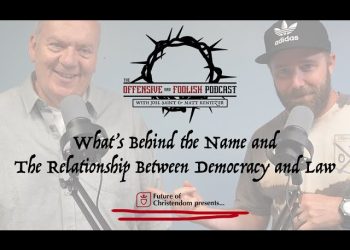Within the Reformed world, there is increasing debate on the topics of theonomy and natural law. Some of it is the result of genuine disagreement on foundational principles. But other aspects of the debate seem to stem from misunderstandings and unclear definitions. For example, when we look at the writings of Thomas Aquinas, we are hit with terms such as eternal law, divine law, human law, and natural law – all of which refer to different things (with some overlap). Then, when we consider the Reformers, we encounter terms such as moral law, ceremonial law, and civil law, which are often used to help organize and categorize the Mosaic Law.
To make things even more difficult, the term “natural law” has been used in a variety of ways. A modern pagan would say that something is binding because it “feels” natural, or right. A pragmatist might say that something naturally becomes law when the majority of society affirms it to be so. But then an enlightenment philosopher could say that natural laws are those things that appear to be universally true and scientifically grounded – as binding as the law of gravity.
Within Christian circles, the term “natural law” might refer to those requirements revealed by God through nature to be binding upon us. Other believers might say that natural law arises from the function and purpose of a thing. This is similar to the understanding that natural law is like the law of gravity, the primary difference being that a thing’s design and purpose is explicitly connected to that thing’s Creator.
Defining Terms
Like in any discussion, we must first define our terms before we can proceed. Starting with a definition of “law,” we can say the following: A law is an obligation given by a higher authority to a lesser authority to either do something (command) or not do something (prohibition).
To make it even more succinct, laws are those requirements that the law-giver makes upon the law-receiver. This leads to the next question: Who is the law-giver? And it is the answer to this question that separates the Christian from the non-Christian.
You see, the Christian begins – and must begin – with the presupposition that God exists and that he has revealed himself. For if this foundation is rejected, then law becomes an altogether different thing. Allow me to explain.
If there is no God and no revelation from God, then law simply becomes a matter of power – might makes right. Whichever human or group of humans ends up on top gets to make the rules. But since those on the top of the pile do not have any inherent right to hold authority (for we are all just chemical reactions), there is no obligation for those on the bottom of the pile to obey. They only do so to avoid suffering as they continue the struggle to be king of the pile. In this situation, law is entirely man-made. Whether law comes from a dictator, an oligarchy, or the majority, it originates with man. And so, in a corporate sense, man gives law to himself. He is autonomous.
But, if God has indeed created the world and revealed himself, then everything changes. Laws come from him and are obligatory upon all who are under his authority. We see this at the very beginning of creation. For, before the entrance of sin, all things obeyed God perfectly. The skies, seas, sun, and moon performed their daily duties while the birds, plants, fish, and animals sought to be fruitful, multiply, and fill the earth (Genesis 1). As God would later tell Job, it was he who placed limits on the sea and said, “thus far you shall come, and no farther” (Job 38:11).
The same was true for mankind. God commanded Adam and Eve to be fruitful and multiply, and he charged Adam with keeping and tending the Garden of Eden (Genesis 2:15). Prior to Adam’s fall, it could be said that obeying God came completely natural to Adam. God’s instructions were clear and not contradictory, and Adam’s obedience would have “felt” right. Furthermore, Adam would have observed the world around him and seen how everything else also obeyed God perfectly.
Sin is Lawlessness
Of course, when Adam and Eve fell and brought sin into the world, everything was affected. Rather than being obeyed, God’s explicit commands to mankind are either twisted or ignored. We see this not only with Satan himself, who twisted Scripture in his effort to tempt Jesus (Luke 4:9-11), but also with the Pharisees, who superseded God’s law with their man-made traditions (Mark 7:6-13). These examples show that sin (i.e., missing the mark) is a deviation from God’s law. That is, it is lawlessness (1 John 3:4).
Due to sin’s effect upon all of creation, nothing functions quite as it should anymore. Our feelings are often deceptive (Jeremiah 17:9), and what might feel natural or good is often just plain wicked. Furthermore, the natural world itself is not always obeying God. By this I do not mean that God is not sovereign, for I affirm the difference between what God commands (i.e., his prescriptive will) and what God controls (i.e., his decretive will). So, when I say that nature is not always obeying God, I refer to the fact that nature is now red in tooth and claw. Female rabbits will kill their own babies if a predator threatens them, while male lions and bears will eat their own young unless the mother protects them.
Restraining Grace
Thankfully, God has not let everything turn into a post-apocalyptic hellscape. Man remains made in the image of God, despite that image being marred and damaged. And nature itself displays aspects of beauty and peace, as if it were groaning for a return to the Garden. Furthermore, the knowledge of God – his eternal power and divine nature – remain in man’s consciousness (Romans 1:20). This includes God’s obligations upon man. Mankind instinctively recognizes the need for a higher law and sometimes, by God’s common grace, aims in the right direction (Romans 2:15). In the words of political philosopher Roberto Unger, humans have “the sense of being surrounded by injustice without knowing where justice lies” (Law in Modern Society).
Fallen man’s recognition of a need for a higher law is more of a form of intuition. But it is an intuition that gropes in the darkness. When it is correct, it is like the broken watch – right twice a day. While it is true that all societies broadly recognize that murder and theft are wrong, they differ in definition and application. For the so-called enlightened man, it is not murder when it is an unborn child, and it is not theft when the person is wealthy.
The Unnatural, the Natural, and the Supernatural
So, while the common benevolence of God keeps us from acting as evil as we could, without further divine intervention we would continue to wander around in the dark. In fact, the darkness would deepen. As the Apostle Paul makes clear, those who engage in idolatry enter into a downward spiral that leads to greater darkness, and eventually to death (Romans 1:24-32). At some point, men and women even begin to exchange what would be considered natural relations “for those that are contrary to nature” (Romans 1:26). Simply put, what is unnatural (i.e. sin) becomes natural while the supernatural (i.e., God’s law) becomes unnatural.
This downward degradation is not only what the darkened heart wants, but also an act of divine judgment. We see a real-world example of this in the people of Israel. For when Israel engaged in idolatry and abandoned God’s law, God judged them by giving them over to what they wanted: “Moreover, I gave them statutes that were not good and rules by which they could not have life, and I defiled them through their very gifts in their offering up all their firstborn, that I might devastate them. I did it that they might know that I am the Lord” (Ezekiel 20:25-26).
We can see from this statement that when we reject God’s law, we are not going to get a somewhat good law, or even a neutral law. Rather, we are going to get a law that leads only to death and devastation. For all laws require a law-giver, and that law-giver will either be God or an idol.
To reinforce the point, and to preemptively respond to the claim that the above words from Ezekiel only have application to the Old Testament nation of Israel, let us consider the words of Jeremiah:
“If at any time I declare concerning a nation or a kingdom, that I will pluck up and break down and destroy it, and if that nation, concerning which I have spoken, turns from its evil, I will relent of the disaster that I intended to do to it. And if at any time I declare concerning a nation or a kingdom that I will build and plant it, and if it does evil in my sight, not listening to my voice, then I will relent of the good that I had intended to do to it.” (Jeremiah 18:7-10)
Here God is not speaking about any specific nation, but is referring to nations in general. And the options for those nations are clear. They can either stop doing evil and listen to God, or they can ignore God and pursue evil. There is no third way.
The Sword of the Spirit
Why is it that, in the above passage, Jeremiah specifically mentions “listening” to the Lord’s voice? Because it is through the word of God that men’s hearts are changed. Although there are many great thinkers and philosophers, some of whom have useful things to say, it is only God’s word that is described as the sword of the Spirit (Ephesians 6:17). And it is this sword that the Spirit uses to pierce the hearts of men (Hebrews 4:12).
When this happens – when we are brought from death to life through the Spirit’s power – we start to become sanctified. God’s law begins to feel more natural to us as our entire being, including our thoughts, feelings, and will, become conformed to the image of Christ. Simply put, what previously felt natural (i.e. sin) begins to feel unnatural, while the supernatural (God’s law) begins to feel more natural.
Back to the Beginning
I mentioned at the start of this article that definitions are key. And just as I began with definitions, I now intend to end with them. Recalling the earlier definition of law, we can say that God’s law refers to our obligations to both God and to our fellow man. Furthermore, we can see that God’s law has been progressively revealed over time. Adam had not been given the Mosaic Law, and the Levitical priests in the Temple had not yet been given their Messiah. It is important to keep this in mind, for when we seek to obey God’s law we must do so in light of Christ, who has not come to abolish the law but to fulfill it (Matthew 5:17).
But is there any room for natural law? Well, if we mean what the Apostle Paul meant regarding the work of the law in Romans 2, then there is no problem. For the law described in Romans 2:15 is the same law referred to in Romans 2:17. That is, when Paul says that “the work of the law is written on the hearts of the Gentiles” and that the Jews are “instructed from the law,” he is not referring to two different laws. There is one law just as there is one law-giver. Paul is not schizophrenically saying that while the Jews have God’s law the Gentiles have something different called the natural law.
Ultimately, a good definition of natural law – if we wish to continue using the term – would be something like the law of God as revealed in nature (i.e. general revelation). This includes the way humans are designed and purposed by God to function as image bearers. We must remember that without reference to God and his word, the concept of natural law becomes meaningless. But even when we do carefully keep natural law tethered to God and his word, we will find that the term is not as helpful as we might think.
For example, Thomas Aquinas himself said that “whatever belongs to the natural law is fully contained in the Law and the Gospel” (Summa Theologica, Question 94, Article 4). If that is the case, then the natural law does not add anything of substance to God’s law. Furthermore, those who appeal to the natural law to augment, enhance, or improve God’s law are not only deviating from Aquinas’s own words but are getting further away from justice. For it is God who defines what is just or unjust. Looking to natural law in order to provide justice implies that God’s law is insufficient for the task.
Interestingly, the English jurist William Blackstone – one of the greatest influences upon America’s Founding Fathers – recognized the inherent weakness of natural law in administering justice. Consider the following statement from Blackstone in his Commentaries on the Laws of England:
And if our reason were always, as in our first ancestor before his transgression, clear and perfect… [discovering the law of nature] would be pleasant and easy; we should need no other guide but this. But every man now finds the contrary in his own experience; that his reason is corrupt, and his understanding full of ignorance and error… [The divine laws], when revealed, are found upon comparison to be really a part of the original law of nature…Yet undoubtedly the revealed law is of infinitely more authenticity than that moral system, which is framed by ethical writers, and denominated the natural law. Because one is the law of nature, expressly declared so to be by God himself; the other is only what, by the assistance of human reason, we imagine to be that law. If we could be as certain of the latter as we are of the former, both would have an equal authority; but, till then, they can never be put in any competition together. (Section 2 – Of the Nature of Laws in General)
Conclusion
So, when we talk about things like taxes, speed limits, building codes, and immigration, it is necessary that we first get the foundations right. That is, we need to discuss the extent of the civil government’s power, including who it can punish, when it can punish, and what those punishments can be. If we say that God’s word does not address these questions, or does not address them sufficiently, then we must rely upon man’s word. We can try to legitimize this by calling it an appeal to natural law, but its content remains man-made. This does not mean that we cannot make reference to things outside of Scripture. I did that very thing in this article, and I fully recognize that both believers and non-believers say true things. But in all that we discuss, including law and justice, our first and final authority ought to be the law-giver himself. He has not left us in the dark, but has given us his written law for our sake (1 Corinthians 9:10). And so, the realm of law, even civil law, is not absent from God’s Word. In fact, the realm of law is nothing more than an extension of loving one’s neighbor. Therefore, if we want to truly love our neighbor, we ought to look to supernatural law rather than to natural law.
























